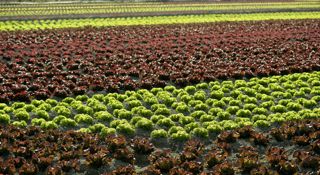| Dangerous pathogen E. coli O157:H7 survives longer in the soil of the Salinas Valley–otherwise known as America's salad bowl–compared to other key leafy greens growing regions, according to new research funding by the U.S. Department of Agriculture. The study, published last month in the journal Environmental Science & Technology found that E. coli O157:H7 survives about 10 days longer in soil in the Salinas Valley than in soil in the Imperial Valley or Yuma, Arizona, two other key growing regions. Low levels of salinity may be a significant environmental factor for the longer survival rate, the authors report, but exactly how higher salinity inhibits the pathogen is not entirely understood.
Researchers found that in the Salinas Valley E. coli O157:H7 can survive about 30 days–in organically managed soils the pathogen survived 31 days, in conventionally managed soils the pathogen survived 28.1 days. There were no differences in the length of survival in conventional and organic in the Imperial Valley, where E. coli O157:H7 lasted about 20 days, 19.3 for organic, 18.4 for conventional. In Yuma, the study found a significant gap between survival times between organic and conventionally-managed soil–E. coli O157:H7 survived 25.7 and 15.5 days, respectively. Understanding how disease-causing pathogens live in soil, among many healthy and beneficial organisms, and understanding how E. coli O157:H7 contaminates soil is critical for helping the industry understand how to design effective preventative practices. One of the study's authors, Mark Ibekwe, a microbiologist with the USDA's Agricultural Research Service in Riverside, California, told the Packer that the results don't give growers a reason to tinker with their soil's salinity, "We are not suggesting that," said Ibekwe. "What we're saying is that because we know there's a longer survival in the Salinas area, we should be very, very careful in introducing pathogens from manure, poorly composted materials or any source at all into the farming environment." © Food Safety NewsMore Headlines from Science & Research |
11.18.2012
Leafy Greens Research: E. coli O157:H7 Survives Longer in Salinas Soil
Subscribe to:
Post Comments (Atom)

No comments:
Post a Comment